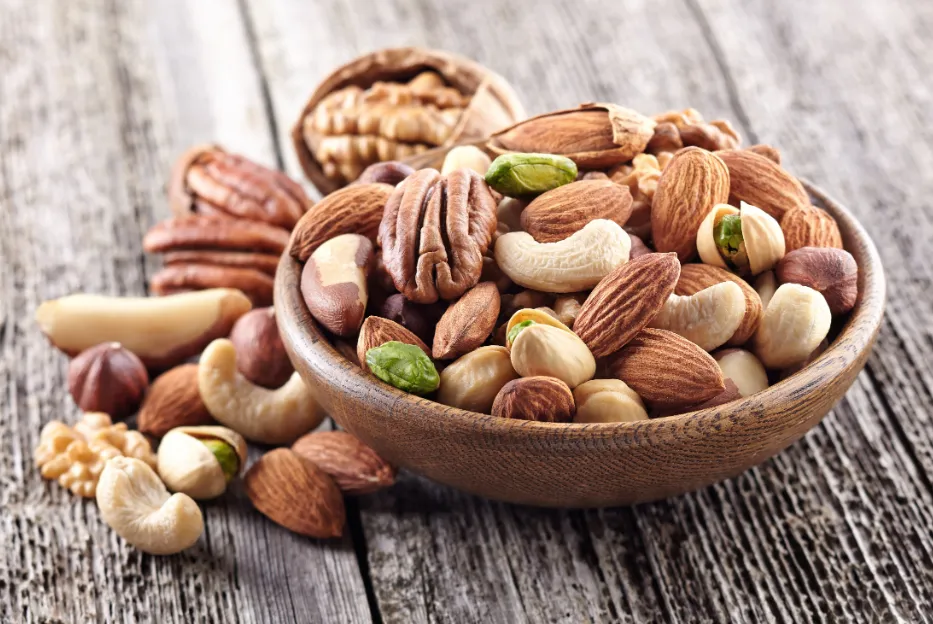9 Foods for Weight Loss, Energy and Overall Health
Discover the Top 9 Foods for Weight Loss, Energy, and Overall Health
Today's blog post will discuss the nine best foods you should incorporate into your diet for weight loss, energy, and overall health. These foods are delicious and easy to incorporate into your daily routine. So, let's dive in!
Discover the Health Benefits of Green-Tipped Bananas: Improved Gut Health, Stable Blood Sugar, and Sustained Energy
1. Bananas that are still a little green at the tip:
Green-tipped bananas are rich in resistant starch, a prebiotic fiber that promotes gut health and weight loss. They are low glycemic and provide sustained energy. Additionally, green-tipped bananas contain higher vitamin and mineral levels than fully ripe bananas. They are an excellent source of vitamin B6, vitamin C, potassium, and dietary fiber, making them a nutritious choice for individuals looking to enhance their overall health.

Regarding gut health, the high content of resistant starch found in green-tipped bananas acts as a fuel source for beneficial gut bacteria, aiding digestion and promoting a healthy balance of gut flora. This can result in improved bowel regularity and a reduced risk of gastrointestinal issues such as bloating or constipation.
Furthermore, the low glycemic index of green-tipped bananas means they have a slower impact on blood sugar levels. This can be advantageous for individuals managing diabetes or those aiming to maintain stable blood sugar levels throughout the day. The sustained energy provided by green-tipped bananas can also benefit athletes or individuals engaging in physical activities, as it helps maintain stamina and endurance.
Incorporating green-tipped bananas into a balanced diet can contribute to better gut health and weight management and support overall well-being and energy levels. Whether enjoyed as a snack, added to smoothies, or incorporated into various recipes, green-tipped bananas offer a delicious and nutritious option for individuals seeking health benefits and sustained energy.
Beans and Lentils: Nutrient-Rich Superfoods for Weight Loss, Cholesterol Reduction, and Gut Health
2. Beans and Lentils:
Beans and lentils are rich in soluble fiber and protein and low in fat. They are great for weight loss, cholesterol reduction, and gut health. Beans and lentils, commonly known as legumes, are highly nutritious and provide numerous health benefits. Packed with soluble fiber and protein and low in fat, these versatile legumes offer many advantages for individuals seeking to improve their overall well-being.
One notable benefit of beans and lentils is their potential to aid weight loss. As they are low in calories and high in fiber, incorporating them into your diet can help you feel fuller for more extended periods, reducing the likelihood of overeating. Additionally, the protein content in legumes can promote satiety, which can further support weight management efforts.
Furthermore, beans and lentils play a crucial role in reducing cholesterol levels. The soluble fiber found in these legumes helps to bind cholesterol in the digestive system, preventing its absorption into the bloodstream. By including these nutritious foods in your meals, you can actively contribute to maintaining healthy cholesterol levels, reducing the risk of heart disease.
Aside from weight loss and cholesterol reduction, beans and lentils contribute to gut health. The soluble fiber in these legumes serves as a prebiotic, nourishing the beneficial bacteria in the gut. This promotes a healthy gut microbiome, essential for proper digestion, nutrient absorption, and overall immune function.
The Health Benefits of Chia Seeds: Brain, Heart, Digestion, and More
3. Chia Seeds:
Chia seeds are loaded with healthy fats, fiber, and protein. In addition to their high content of healthy fats, fiber, and protein, chia seeds have gained popularity due to their numerous health benefits. These tiny seeds are packed with essential nutrients, making them valuable to any diet.
One of the main benefits of chia seeds is their high omega-3 fatty acid content. Omega-3s are essential fats crucial in brain health, reducing inflammation, and improving heart health. Consuming chia seeds regularly can contribute to maintaining a healthy cardiovascular system and promoting brain function.
Fiber is another significant component found in chia seeds. With high soluble and insoluble fiber levels, these seeds can help promote healthy digestion and regulate bowel movements. Adequate fiber intake also helps control appetite and maintain a healthy weight.
Chia seeds are also an excellent source of plant-based protein, making them a valuable option for those following vegetarian or vegan diets. Protein is essential for building and repairing tissues, supporting muscle growth, and maintaining a robust immune system.
Furthermore, chia seeds are rich in antioxidants, which help protect against cellular damage caused by harmful free radicals. These antioxidants reduce the risk of chronic diseases like cancer and heart disease.
The Nutritional Power of Nuts and Seeds: Protein, Healthy Fats, and Fiber for Heart Health and Disease Prevention
4. Nuts and Seeds:
Nuts and seeds are packed with protein, healthy fats, and fiber. In addition to being nutrient-dense, wild seeds offer numerous health benefits. They are an excellent source of plant-based protein, making them a valuable addition to vegetarian and vegan diets. The high content of healthy fats found in nuts and seeds, such as monounsaturated and polyunsaturated fats, can help reduce the risk of heart disease by improving cholesterol levels and promoting overall cardiovascular health.

Moreover, nuts and seeds are also rich in dietary fiber, which aids in digestion, promotes satiety, and helps regulate blood sugar levels. Their fiber content can play a significant role in maintaining a healthy weight and preventing conditions such as obesity and type 2 diabetes.
Furthermore, consuming nuts and seeds has been associated with a reduced risk of chronic diseases, including certain types of cancer. They are a valuable source of antioxidants, vitamins, minerals, and phytochemicals with anti-inflammatory and immune-boosting properties.
Including nuts and seeds in a balanced diet can improve brain function, as they contain essential nutrients like omega-3 fatty acids, vitamin E, and magnesium. These nutrients are crucial for cognitive development, memory, and concentration.
The Nutritional Powerhouse: Eggs
5. High-Quality Eggs:
Eggs are nutrient powerhouses packed with protein, vitamins, and minerals. They are considered among the most nutritious foods, offering various health benefits. Eggs are an excellent source of high-quality protein, essential for building and repairing body tissues, supporting muscle growth, and maintaining overall strength and vitality.
In addition to protein, eggs are rich in essential vitamins and minerals. They contain vitamins A, D, E, and B-complex, such as B12, riboflavin, and folic acid. These vitamins are crucial in promoting healthy vision, supporting the immune system, maintaining brain function, improving skin health, and producing red blood cells.
Moreover, eggs are a great source of iron, calcium, zinc, and selenium minerals. Iron is essential for producing hemoglobin, which carries oxygen in the blood. At the same time, calcium is vital for strong bones and teeth. Zinc and selenium, on the other hand, contribute to boosting the immune system and regulating thyroid function.
In conclusion, the nutritional value of eggs must be balanced. They provide many essential nutrients, including high-quality protein, vitamins, and minerals. Contrary to popular belief, eggs are not rotten for cholesterol levels and can improve heart health.
Benefits of Grass-Fed Beef: Lower Calories, Healthier Fats, and Enhanced Nutritional Profile
6. High-quality grass-fed Beef:
From a nutritional perspective, grass-fed beef tends to be lower in overall calories compared to its grain-fed counterparts. This is primarily because grass-fed cattle typically have a leaner body composition. These animals' natural grazing diet helps them develop muscle mass and reduce excessive fat. A study published in the Journal of Animal Science found that grass-fed beef had around 12% fewer calories on average than grain-fed beef.
Moreover, the fat content in grass-fed beef is significantly different from that found in grain-fed or corn-fed meat. Grass-fed beef generally contains more omega-3 fatty acids, conjugated linoleic acid (CLA), and other beneficial polyunsaturated fats. These fats are associated with a range of health benefits, including reduced inflammation, improved heart health, and enhanced brain function. In contrast, grain-fed or corn-fed beef often contains higher levels of omega-6 fatty acids, which, in excess, can contribute to inflammation and specific health issues.
Research also suggests that grass-fed beef can have higher levels of antioxidants, vitamins, and minerals than grain-fed beef. The natural grass-based diet provides higher amounts of vitamins A and E and minerals like magnesium, potassium, and calcium. These nutrients are crucial in maintaining optimal health. They are typically more abundant in grass-fed beef due to the cattle's natural grazing habits.
In addition to its nutritional benefits, grass-fed beef is often promoted as more environmentally sustainable. Cattle raised on pasture rely on natural forage rather than the resource-intensive grain feed commonly used in conventional beef production. This leads to a reduced carbon footprint, lower greenhouse gas emissions, and a decreased demand for intensive farming practices.
Avocados: A Fiber-Rich Superfood for Digestion, Blood Sugar Control, and Weight Management
7. Avocado:
In addition to their delicious taste, avocados have gained popularity due to their numerous health benefits. These fruits are packed with healthy fats, including monounsaturated fats, which are known to support heart health and reduce harmful cholesterol levels. The presence of fiber in avocados aids in digestion, promotes satiety, and helps maintain a healthy weight.
One of the unique nutrients found in avocados is Avocatin-B. This compound plays a crucial role in regulating blood sugar levels. This nutrient mainly benefits individuals with diabetes or those at risk of developing the condition. By increasing insulin sensitivity, avocados can help improve glucose control and prevent sudden spikes or crashes in blood sugar levels.
Furthermore, the combination of healthy fats, fiber, and Avocatin-B in avocados contributes to a longer-lasting feeling of fullness and can aid in weight management. Incorporating avocados into a balanced diet may help prevent overeating and maintain a healthy body weight.
Research has also suggested that avocados contain antioxidants and anti-inflammatory properties, which could protect against chronic diseases such as cardiovascular conditions, arthritis, and certain types of cancer.
The Nutritional Power of Seafood: Omega-3 Fatty Acids for Heart and Brain Health
8. Certain Seafoods:
In the realm of nutrition, it is well-known that certain types of seafood, such as sardines, wild salmon, and shellfish, boast an impressive content of omega-3 fatty acids. These essential nutrients are renowned for their numerous health benefits, particularly their positive effects on heart and brain health.

Omega-3 fatty acids are polyunsaturated fats crucial in maintaining optimal health and well-being. While they are found in various food sources, seafood - particularly sardines, wild salmon, and shellfish - is an excellent and reliable source of these beneficial fats.
Regarding heart health, omega-3 fatty acids have been extensively researched and have repeatedly shown their ability to reduce the risk of cardiovascular diseases. They work their magic by lowering blood pressure, reducing triglyceride levels, and preventing the formation of blood clots. By incorporating seafood rich in omega-3s into one's diet, individuals can reduce their chances of experiencing heart-related issues and promote a healthier cardiovascular system.
Furthermore, omega-3 fatty acids are widely acclaimed for their positive impact on brain health. These fatty acids are essential for developing and maintaining brain cells, aiding in cognitive function, memory retention, and mood regulation. Research has even suggested that a diet rich in omega-3s may help reduce the risk of developing mental disorders such as depression, anxiety, and even Alzheimer's disease.
In addition to their heart and brain benefits, omega-3 fatty acids have also been linked to positive outcomes in various other areas of health. These include reducing inflammation, supporting healthy joint function, promoting eye health, and boosting overall immune function.
While it is important to note that omega-3 fatty acids can also be obtained through plant-based sources like flaxseeds, chia seeds, and walnuts, seafood remains an exceptional choice due to its high concentration of these beneficial fats. Incorporating sardines, wild salmon, and shellfish into one's diet provides a convenient and effective way of reaping the numerous health advantages associated with omega-3s.
Blueberries: A Brain-Boosting Superfood with Weight Loss Benefits
9. Organic Blueberries:
Blueberries are significantly enriched with bioflavonoids and their various health benefits. These bioflavonoids are crucial in supporting and enhancing cognitive health, making blueberries an exceptional addition to one's diet.
Cognitive health is essential for optimal brain function, memory retention, and overall mental well-being. Bioflavonoids found in blueberries have been shown to possess potent antioxidant and anti-inflammatory properties, which can help protect brain cells from oxidative stress and reduce inflammation, thus potentially lowering the risk of age-related cognitive decline.
Furthermore, blueberries are widely recognized for their potential to aid weight loss efforts. The bioflavonoids in these berries have been linked to enhancing metabolism, improving insulin sensitivity, and reducing fat accumulation. This makes blueberries a valuable addition to any weight management regimen.
Besides their bioflavonoid content, blueberries are also rich in essential vitamins, minerals, and dietary fiber, all contributing to overall health and well-being. Their low calorie and high nutrient density make them ideal for individuals aiming to maintain a balanced diet while actively seeking cognitive health improvements and weight loss.
Conclusion:
Incorporating these nine best foods into your diet can significantly improve your health, aid in weight loss, and provide sustained energy throughout the day. Remember to choose high-quality, organic options whenever possible for maximum benefits. Experiment with different recipes and find your go-to healthy foods that you enjoy. If you need further guidance, consider joining a nutrition program or utilizing free online resources. Start changing your diet daily and reap the benefits of a healthier lifestyle.
